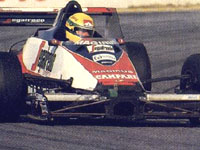A carefully planned agenda to inspiration
Author
- Mattijs Diepraam
Date
- 8W March 1999 issue
Related articles
- Stefan Bellof - Talent overplayed, by Leif Snellman/Tom Prankerd
- Stefan Johansson - The deer hunter, by Rainer Nyberg/Mattijs Diepraam/Geza Sury
- Alain Prost - Subtlety redefined, by Mattijs Diepraam/Rainer Nyberg
- Ayrton Senna - His first taste of F1, by Mattijs Diepraam
- Ayrton Senna - The last 96 hours of Ayrton Senna, by Dylan Jones
Who?Ayrton Senna What?Toleman-Hart TG183B Where?Kyalami When?1984 South African GP |
 |
Why?
A demi-god by life, Ayrton Senna da Silva must have felt gutted into his grave about his bitter rival Alain Prost managing to score a World Championship point on his debut. This when Senna himself only succeeded to finish 6th in his second race, here at Kyalami...
Apart from their historic rivalry, the two winningest drivers in F1 history have more in common than Senna would have liked. Although their approach to F1 racing differed immensely - Prost the calm and collected intellectual, Senna the gifted, overzealous natural - both men are solely responsible for stepping up F1 to its current ulta-professional level of dedication. While the other greats of the era, like Piquet, Mansell and Berger, still exuded a brash sixties-style pleasure in and out of the sport - Nelson after his F1 retirement enjoying himself in Indycars, GTs and even SudAm F3, Nigel apart from working at his golf handicap having some fun in British touring cars - Senna and Prost set everything aside to achieve their goals in F1, refusing to dilute their efforts by toying around with petty distractions.
It has been pointed out now on innumerable occasions: Ayrton Senna's religious devotion to becoming the best, never easing off to prove he was, has set an example to his rightful heir Michael Schumacher, the German today promoting the agnostic ‹bermensch alternative to Senna's almost divine self-belief. Just as Schumacher's career Senna's route into F1 shows all the signs of careful planning. From Ayrton's F Ford days (here seen driving a Van Diemen RF82 at Zandvoort in his title-winning 1982 European FF2000 campaign, scoring seven wins and taking pole at all nine events) and his record-breaking British F3 title for Dick Bennetts to his highly political move to Lotus or his timely switch to McLaren - everything fitted perfectly. Even the big teams - notably Williams - missing out on him first time out, Toleman scooping the Brazilian youngster, could not detract him from following the path to success he himself had probably already set out as a teenager when cleaning up national karting championships.
Signing for Toleman turned out to be a well-judged move to a team on the up, Senna shrewdly positioning himself to shine with an almost watertight guarantee, showing he could do the impossible in an inferior machine judged to be the ugliest F1 design in history. The advent of the prettier TG184 enabled Ayrton to enhance his reputation even further before falling out with Toleman management before the Italian GP. Suddenly, with Johnny Cecotto unable to live up to expectations, we saw a totally new Toleman crew, Stefan Johansson lining up in Senna's deserted No.19 car and young Pierluigi Martini debuting in the No.20 entry vacated by Cecotto. Remarkably, with Martini failing to qualify, Senna came out as the winner of the conflict, Toleman taking him back for the final two races, being rewarded with a further 3rd at the final race at Estoril.
With Lotus, Senna started off an amazing streak of pole positions and wins, with especially his poles tally reminding of his total domination of Formula Ford in 1981 and '82. At Imola '94 the pole counter abruptly stopped at 65, a total which will remain unsurpassed with an almost absolute certainty.
